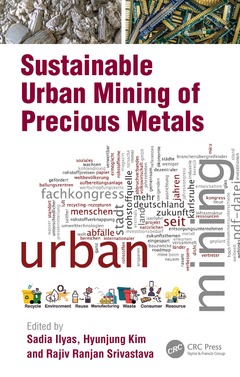Description
Sustainable Urban Mining of Precious Metals
Coordinators: Ilyas Sadia, Kim Hyunjung, Srivastava Rajiv Ranjan
Language: English
Subjects for Sustainable Urban Mining of Precious Metals:
Keywords
Gold, Silver, Platinum, Lixiviant, Leaching, Liquors, Remediation, E-Waste, Waste Printed Circuit Boards, hybrid extraction techniques, Wet High Intensity Magnetic Separators, supercritical fluids extraction, Leach Liquor, precious metals, Gold Leaching, solvent extraction, Eh pH Diagram, sustainable urban mining, Free Cyanide, Thiourea Concentration, Pulp Density, Cyanide Solution, Gold Adsorption, Metal Thiourea Complexes, Acidic Thiourea Solutions, E-waste Management, Chromobacterium Violaceum, E-waste Generation, Strong Base Resin, Transition Metals, Chelating Exchangers, Eddy Current Separator, Cyanide Leaching, Weak Base Groups, HBr Solution, Cyanex 301, Urban Mining, Ammine Complexes
· 15.6x23.4 cm · Hardback
Description
/li>Contents
/li>Biography
/li>
The rapid revolution in modern industry has led to a significant increase in waste at the end of the product lifecycle. It is essential to close the loop, secure resources, and join up the circular economy. This book provides a detailed review of extraction techniques for urban mining of precious metals including gold, silver, and the platinum group. The merits and demerits of various extraction methods are highlighted, with possible suggestions for improvements. The feasibility of hybrid extraction techniques, as well as the sustainability and environmental impact of every process, is explored.
- Offers a comprehensive review of different techniques used in recycling technology for urban mining of precious metals
- Describes the concept of urban mining and its correlation with circular economy
- Discusses feasibility of precious metal extraction and urban mines scope and their potential
- Explains the subject in-context of sustainability while describing chemistry fundamentals and industrial practices
- Provides technical flow sheets for urban mining of precious metals with diversity of lixiviant
This book is aimed at graduate students and researchers in extractive metallurgy, hydrometallurgy, chemical engineering, chemistry, and environmental engineering.
1. Sustainable Urban Mining of Precious Metals: An Introduction. 2. Pre-treatment, Concentration, and Enrichment of Precious Metals from Urban Mine Resources. 3. Urban Mining of Precious Metals with Halide as Lixiviant. 4. Urban Mining of Precious Metals with Cyanide as a Lixiviant. 5. Urban Mining of Precious Metals with Thiosulphate as a Lixiviant. 6. Recovery of Precious Metals by Precipitation, Adsorption, Electrowinning, Supercritical Fluids, and Bio-mediated Approaches. 7. Recovery of Precious Metals by Solvent Extraction. 8. Recovery of Precious Metals using Ion-exchange Chromatographic Approaches. 9. Integrated Recovery Processes for Precious Metals from Urban Mine Sources and Case Studies.
Sadia Ilyas is currently working as Brainpool Scientist (NRF)/Research professor at the Department of Mineral Resources and Energy Engineering at Jeonbuk National University in Jeonju, Republic of Korea. After receiving her M.Phil. and Ph.D. in Inorganic Chemistry from Bahauddin Zakariya University, Multan and University of Agriculture, Faisalabad, Pakistan, respectively; she served in China as Senior Researcher at the School of Chemical Engineering and Pharmacy (Wuhan) and in Korea as Postdoctoral fellow at Korea Institute of Geoscience and Mineral Resources, and in Pakistan as Assistant Professor at GC University, Faisalabad. Besides the academic lecture in Inorganic Chemistry her research deals with hydrometallurgical exploitation of energy-critical elements and urban mining of value added metals. She has published more than 50 research articles in peer-reviewed international journals and also author in 25books/contributed book chapters/text books/ laboratory manuals.
Hyunjung “Nick” Kim is the Professor at the Department of Mineral Resources and Energy Engineering at Jeonbuk National University in Jeonju, Korea. Dr. Kim received his B.S. and M.S. degrees from Hanyang University in Seoul, Korea and Ph.D. from the University of California, Riverside in Chemical and Environmental Engineering. He specializes in colloidal chemistry, froth flotation, bio-hydrometallurgy and microplastics with over ten years of academic research experience. Prof. Kim is currently serving as the Editorial Member/Associate Editor in several reputed journals. Prof. Kim has authored more than 100 refereed journal publications, several book chapters. He has been awarded the Young Scientist award from the Industrial Minerals & Aggregates Division of the Society for Mining, Metallurgy, and Exploration (SME) in 2016. Prof. Kim also served as lead director of BK-3, one of the prestigious project of Korea. Prof. Kim also served as lead director of




